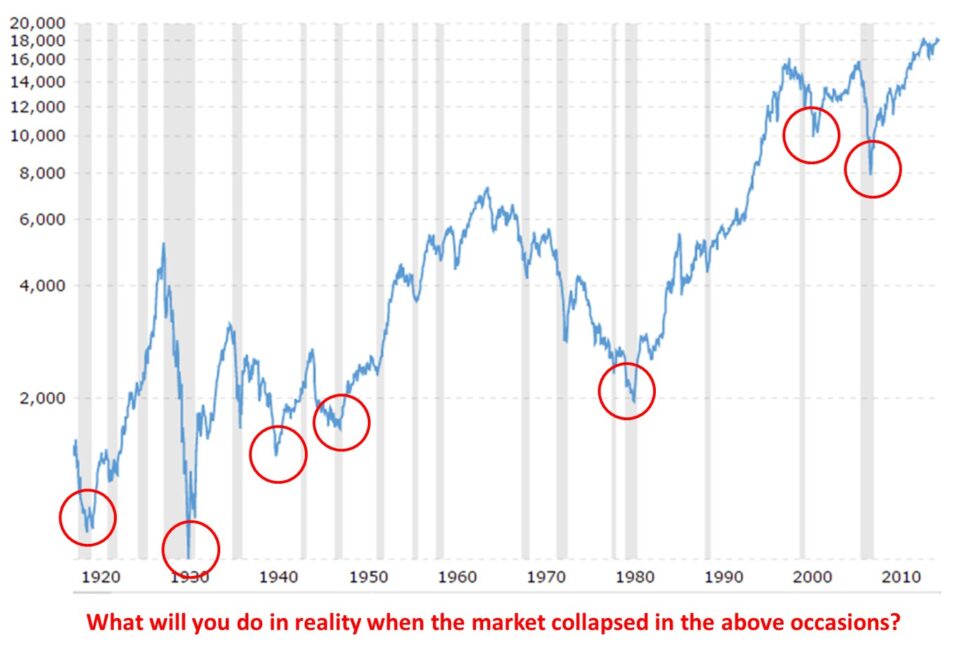SUMMARY
- Investors need to answer an important question: What do they do when stock prices drop and a bear market arrives?
- Is there a difference between what they said they would do and the reality of the situation?
- Over the long term, one thing is certain; the stock market will recover and investors can take advantage of bear markets to earn superior returns
INTRODUCTION
This scenario that I’m about to describe may sound familiar to most of us who have been investing for a while now:
You have successfully set aside a sum of money to invest in the stock market. After transferring it to your brokerage account, you proceeded to build a shopping list of solid companies that you would buy when the market falls.
And then, it happened. The stock market corrects itself and stocks that previously looked expensive are finally selling at a steep discount.
Here is the important question: What would you do?
Now, I know many investors who will say that the answer is pretty obvious; they would put some of that cash on the side lines to good use. They would “be greedy when others are fearful”.
But is that really the case?
DEFINING REALITY
I have faced a couple of pullbacks as an investor over the last four years and I am certain that I did not always adopt Warren Buffett’s famous mantra. As long-term, business-focused investors, we need not get many things right. In fact, there are only a few critical ones to take note of.
At the top of that list is learning how to behave when the bear market arrives. Let’s face it – you can have the best business acumen when it comes to stock picking and none of that would matter if you allow your emotions to get the best of you and sell when the market falls. You will ultimately fail to build wealth over the long term.
WHEN WILL THE MARKET PULL BACK?
Perhaps, let’s ask another question.
Is that something that long-term investors should focus on? And why should we?
No one has been able to successfully predict the next bear market. We know that market pullbacks and crashes are common, but we know surprisingly little about the actual reason of why they happen in the first place.
Over the last century, the Dow Jones and S&P 500 index has declined time and again. What is also true is that both of indexes also rose every time they were crushed.

macrotrends.net
The above chart shows the Dow Jones Index over the last century or so. In the 1920s, the index fell to the lowest in the history of the stock market. It then went on to deliver one of the best performance, percentage wise, over the next 5 years (1930 – 1935) before slightly dipping again.
One of the hardest investing concepts to grasp with is that high future performance begins during periods of low current performance. It’s hard to grasp with because it’s counterintuitive. People have the tendency to extrapolate the recent past into the future. When stocks are doing poorly, they assume they’ll keep doing poorly in the future.
If history was any indication, the exact opposite is true.
CONCLUSION
Being in a bear market presents an opportunity for all of us because it allows us to purchase stocks at a discount every now and then. By doing so, we enhance our returns as the years go by.
The stock market has always moved higher and there are mountains of scientific data to back up that claim. If investors are able to take hold of the long term view, bears markets are to be celebrated.
Why? Because after that, the markets are going higher.
If you don’t buy a stock when the share price falls, how are you going to make money when the share price rises?
But in order to do this right, you’d need to know what stocks to buy. Most of the companies in the stock market unfortunately do not do very well. That’s why the hallmark of value investing is to buy good companies at their intrinsic value. In other words, an undervalued stock.
If you want to know how to do this correctly to generate streams of passive income, you may simply sign up a Value Investing Masterclass.
DISCLOSURE
The above article is for educational purposes only. Under no circumstances does any information provided in the article represent a recommendation to buy, sell or hold any stocks/asset. In no event shall ViA or any Author be liable to any viewers, guests or third party for any damages of any kind arising out of the use of any content shared here including, without limitation, use of such content outside of its intended purpose of investor education, and any investment losses, lost profits, lost opportunity, special, incidental, indirect, consequential or punitive damages resulting from such unintended use.













